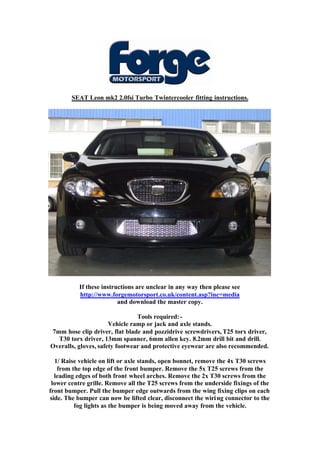Fmintlfs instructions
- 1. SEAT Leon mk2 2.0fsi Turbo Twintercooler fitting instructions. If these instructions are unclear in any way then please see http://www.forgemotorsport.co.uk/content.asp?inc=media and download the master copy. Tools required: - Vehicle ramp or jack and axle stands. 7mm hose clip driver, flat blade and pozzidrive screwdrivers, T25 torx driver, T30 torx driver, 13mm spanner, 6mm allen key. 8.2mm drill bit and drill. Overalls, gloves, safety footwear and protective eyewear are also recommended. 1/ Raise vehicle on lift or axle stands, open bonnet, remove the 4x T30 screws from the top edge of the front bumper. Remove the 5x T25 screws from the leading edges of both front wheel arches. Remove the 2x T30 screws from the lower centre grille. Remove all the T25 screws from the underside fixings of the front bumper. Pull the bumper edge outwards from the wing fixing clips on each side. The bumper can now be lifted clear, disconnect the wiri ng connector to the fog lights as the bumper is being moved away from the vehicle.
- 2. 2/ Unclip the air temp sensor from its plastic guide on the left front of the car. Then remove both air guides behind the bumper, these have a single plastic push in clip that requires removal in order to free the air guides. Remove the 8x T25 screws in order to remove the complete engine under tray. Remove both lower standard intercooler hoses; these are just clipped in via a spring clip. Prize this away with a flat end screwdriver to aid removal of the hose end fitting, these will not be refitted but the seals are required later so place to one side for now.
- 3. 3/ Remove the horns form their brackets, now remove each bracket from the car and refit the horns as per the pictures below with the new brackets supplied so they are now sited higher. This is to allow the new hoses a free routing below the horns.
- 4. 4/ Mark the crash bar brackets on the inner edge as per the picture below. Drill an 8.2mm hole and debur the edges. 15mm in from the front edge and 10mm from the bottom edge is the ideal centre for the drill hole. Do the same on the left and right bracket. Make sure all swarf from drilling is cleaned away and none of this has been allowed to enter the new intercooler or hoses to be fitted next. 5/ Attach the brackets to the crash bar brackets as pictured below using the nuts and bolts supplied. Then mount the intercooler in to place also but only assemble the fixing nuts and bolts loosely at this stage.
- 5. 6/ Remove the oil seals from the original intercooler hoses and fit these to the corresponding new aluminium hose couplings as pictured below. Fit the hose couplings into the respective fittings on the original intercooler and the turbo outlet pipe on the right side running alongside the engine sump. Make sure the spring clips are located securely to prevent these couplings from being blown out of the fixings under boost.
- 6. 7/ Now fit the new hoses to join all the couplings and the new intercooler. The hoses may require a test fit to make sure they do not foul on any other engine or front panel components. A small amount of trimming may be required on the hoses at the new intercooler joints. Once you are satisfied with the fitment then secure all the hoses with the hose clips supplied.
- 7. 8/ Now centralise and tighten the fixing bolts on the intercooler. Fit the ambient temperature sensor as indicated below. 9/ Before the bumper can be refitted you have to remove the lower plastic brace panel as shown below. This can be simply removed from its plastic fixings with a sharp knife and a drill.
- 8. 10/ The bumper and the engine under tray can now be refitted. Lower the vehicle to the ground. Make sure all tools are removed from the vehicle before road testing. You are now ready to enjoy the new found performance of your vehicle. Engineered for performance








